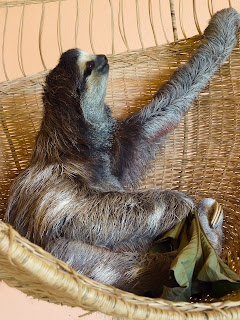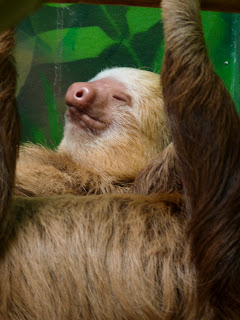Today Leka and Kaisa did a half-day
trip to the nearby Sloth Sanctuary, a refuge for orphaned and/or
injured sloths where visitors can also go on a canoe tour in shallow
channels criscrossing the rainforest. Lina decided to stay at the
hostel, as she's grown quite attached to the seaside hammocks.
Actually it should be mentioned that we
were originally supposed to go snorkeling today, but the sea was so
high that we were adviced to switch it to tomorrow morning. Kaisa had
been pining for the sloths ever since we saw their information center
on the way here, and now it seemed that the forces of nature had
decided that she should be allowed to go see them.
At the sanctuary we learned that it's
totally old-fashioned to talk about three-toed or two-toed sloths, as
all of them actually have three toes on their hind legs. It's the
front legs that are different, so three-fingered and two-fingered are
the correct terms. The two species are slightly different in size,
build and temperament.
The sanctuary receives sloths from
people who have found them in the nature, and attempts to nurse them
back to health and release them into the forest. However, sloths that
have been orphaned at an early age can't make it in the wild, as they
lack the instruction their mother would've given them during the year
they would've clung to the mother's belly. This includes which plants
are safe to eat and which not. So some of the sloths become permanent
residents and the sanctuary, and we got to meet a few of them.
The most famous sloth of them all is
Buttercup, a 20-year old three-fingered sloth who kind of started the
whole thing when she was brought to the owners as a baby. Buttercup
was hanging out in the cafeteria, and unlike many of the others adult
sloths seemed to enjoy our attention and happily pose for the camera.
We also got to visit the nursery where
baby sloths are bottle-fed with goat milk and later on munch on
boiled, peeled and chopped vegetables. But Kaisa's favorite still was
Toyota, a male who had been found critically injured when climbing on
a powerline, with serious burns on all his limbs. He had been lying
wounded on the ground for weeks so his left arm was gangrenous and
had to be amputated, but miraculously he recovered and is now living
happily at the sanctuary.
These curious animals somehow seem very
helpless but simultaniously very enduring, being able to heal
themselves even when seriously injured and survive for millenia in
forests filled with predators despite their slowliness. Their biggest
enemy today are – surprise, surprise – humans, with roads built
in their paths, deforestation destroying their habitat and pesticides
poisoning their food. But at least some people are trying to do some of the damage.









Ei kommentteja:
Lähetä kommentti